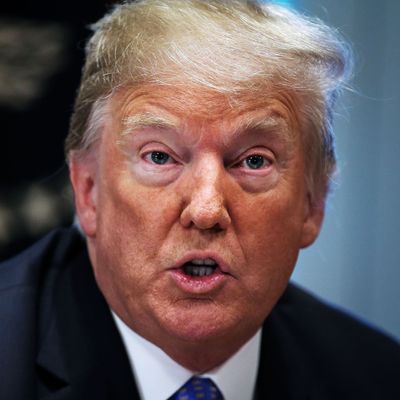
We are in a period of especially strange and incoherent presidential tweets. But this one deserves some serious scrutiny, reflecting as it does the odd tenets of Trumponomics.
Now, it’s been a very long time since American political leaders thought of tariffs as a significant revenue source for the federal government. Before the enactment of the federal income tax in 1913, tariffs accounted for roughly a third of federal revenues. Tariffs dropped to 5 percent of revenues by 1918, and more or less steadily declined after that. By 2012 tariffs were roughly one percent of federal revenues: in other words, a drop in the bucket.
Clearly, Trump’s trade war will, at least temporarily, boost tariff revenue, but as Jim Tankersley points out, it’s not a lot of scratch when you compare it not only to a $21 trillion debt but to the debt being added each year by Trump and his Republican Congress:
Let’s assume every tariff Mr. Trump has proposed thus far this year goes into effect, at the maximum possible rate, and that American consumers keep buying all those imported products even if they are much more expensive. Those are dubious assumptions — particularly because consumers would likely switch their buying habits to favor goods not affected by tariffs — but let’s go with them for now.
A proposed 25 percent tariff on $200 billion in additional imports from China would raise $50 billion a year. A proposed 25 percent tax on imported automobiles and auto parts would raise $85.25 billion.
That’s a lot of money. It’s a real boost to federal revenue, along with, in basically every economist’s model of how tariffs work, a tax increase on American consumers. And it remains at least $664 billion short of what you would need to start paying off debt.
A big part of the problem, of course, is this year’s projected $800 billion budget deficit — which is projected to rise to more than a trillion dollars next year.
So unless Trump plans to boost tariffs to 19th-century levels, or pare back his party’s tax cuts, or give the Pentagon a haircut instead of throwing money at it hand over fist, or violate his promise not to cut the big middle-class entitlement programs, there’s no debt reduction in sight. True, we are not talking about someone who is very precise or reliable in his fiscal commitments: During the 2016 campaign he promised to eliminate the national debt. But there’s not an actual plan in place to eliminate the annual budget deficits that add to the debt, even though, characteristically, Trump is talking about adding even more debt by additional tax cuts.
On top of everything else, let’s remember that Trump and his aides have told people damaged by the new tariffs or by retaliatory tariffs from China and elsewhere that it’s all a temporary problem that will be resolved once he’s forced other countries to the table to work out better trade deals. If tariffs are mostly a diplomatic weapon rather than an end in themselves, they won’t be available forever to pay down the national debt, will they?
On the fiscal front tariffs will mostly amount to an unstable and modest source of revenues insufficient to address a debt problem that Trump keeps making far worse. So tariff revenue is hardly a major silver lining for a trade war that is so dangerous in so many other ways.






























